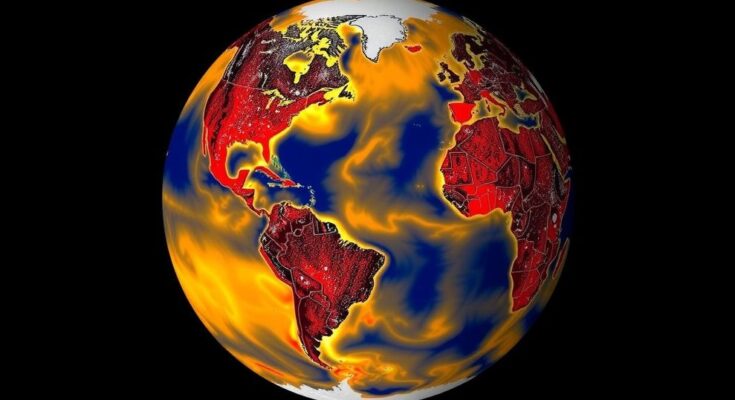For the third consecutive year, global warmings projections remain unchanged, with rising emissions from China and potential policy shifts in the United States threatening future outcomes. During the ongoing U.N. climate talks in Baku, nations are negotiating financial aid for developing countries and aiming for new emission reduction targets. The required climate financing is projected to reach $1 trillion yearly, emphasizing the need for substantial international commitment to combat climate change.
For the third consecutive year, projections regarding global warming have not improved, despite international efforts to combat climate change. Recent developments in both China and the United States are anticipated to exacerbate these projections, as highlighted in an analysis released shortly before the 29th iteration of the United Nations climate conferences in Baku, Azerbaijan. During these negotiations, global leaders aim to establish enhanced targets for reducing emissions and to negotiate compensation from wealthy nations to assist poorer countries in achieving these goals. According to the Climate Action Tracker, the Earth’s temperature is expected to rise by approximately 2.7 degrees Celsius relative to pre-industrial levels. This alarming trend raises questions about the efficacy of the ongoing United Nations climate meetings, commonly referred to as COP. Bill Hare, CEO of Climate Analytics, remarked, “…it feels broken” when considering the lack of significant progress in reducing emissions despite encouraging developments in certain areas. The current global temperature has already increased by 1.3 degrees Celsius, nearing the 1.5-degree threshold established during the 2015 Paris climate accords. Climate scientists attribute this rise primarily to human-induced activities such as fossil fuel burning, which contribute to more severe and extreme weather patterns, including flooding and droughts. Notably, projections from Climate Action Tracker suggest potential increases in warming across various scenarios. In particular, findings show that projected outcomes based on current promises could reach 2.6 degrees Celsius, slightly higher than previous forecasts. Even under the most favorable scenario—assuming all nations fulfill their commitments—the temperature could rise by 1.9 degrees Celsius, which registers a minor increase from the prior year. Sofia Gonzales-Zuniga, a lead author, notes that this increase is largely influenced by rising emissions in China, which, although starting to stabilize, have peaked above initial expectations. Moreover, the forthcoming U.S. elections may introduce additional challenges for climate efforts. If a return to previous deregulatory policies occurs, projections could rise by 0.04 degrees Celsius, signaling potential setbacks in existing climate strategies. Such dynamics may also prompt other nations to relax their commitments. Bill Hare expressed concern, stating, “For the U.S. it is going backwards,” contrasting this with China’s more promising potential for a substantial decrease in emissions. He emphasized the urgent need for action given the increased frequency and severity of climate-related disasters. At the 2023 Baku talks, delegates are engaged in discussions over financial aid directed at assisting developing nations in transitioning to greener energy, mitigating climate change impacts, and addressing damage incurred from severe weather. The existing goal of $100 billion in annual support has reached its expiration, prompting calls for a revised, larger commitment. A report commissioned by U.N. Secretary-General Antonio Guterres proposed a tripling of the previous financial commitment, asserting that advanced economies must demonstrate a serious commitment to aiding poorer nations. A coalition representing these nations is seeking $1.3 trillion annually in climate financing, while experts assert that approximately $1 trillion is required from international sources for developing nations. The estimated overall spending necessary for climate adaptation across all countries is projected at $2.4 trillion per year, underscoring the urgent need for substantial investment in clean energy, biodiversity protection, and resilience to climate impacts.
The topic at hand pertains to the ongoing challenges in climate change mitigation and the international community’s responses to the escalating issue of global warming. Despite various engagements and negotiations aimed at addressing this pressing problem, recent analyses indicate a stagnation in the world’s warming projections, particularly in light of contributions from major emitting nations. The context of these discussions is framed by the United Nations climate talks, which serve as a platform for collective action towards sustainable development and the reduction of greenhouse gas emissions.
In summary, the recent analysis underscores the stagnation in warming projections despite global efforts to counter climate change, exacerbated by the actions of leading emitters like China and potential policy shifts in the United States. The urgency for comprehensive investment and collaborative international financial commitments is more pressing than ever. The ongoing negotiations in Baku aim to address these economic challenges while striving for effective strategies to mitigate climate change impacts, particularly for developing nations facing the brunt of environmental consequences.
Original Source: www.voanews.com




